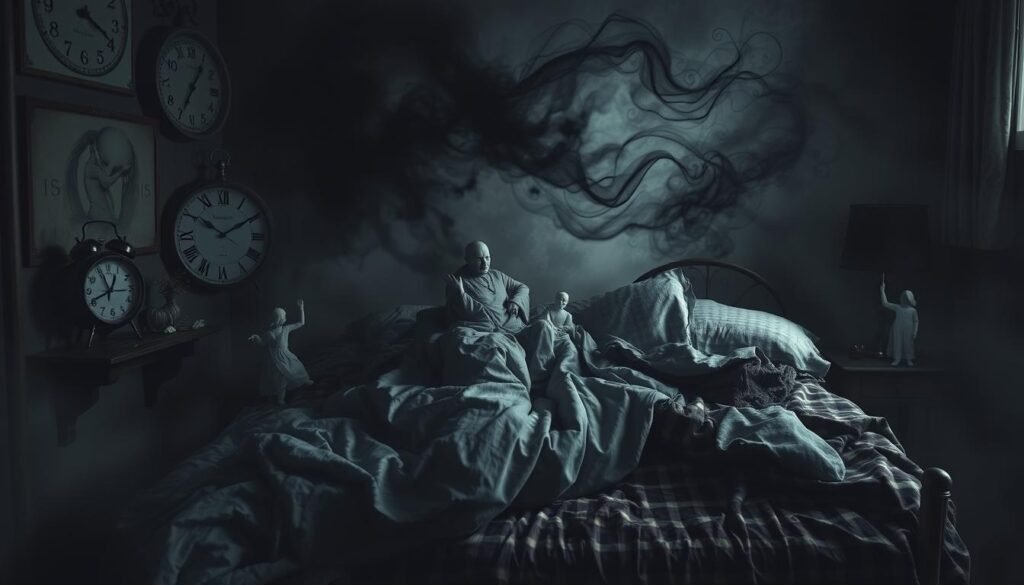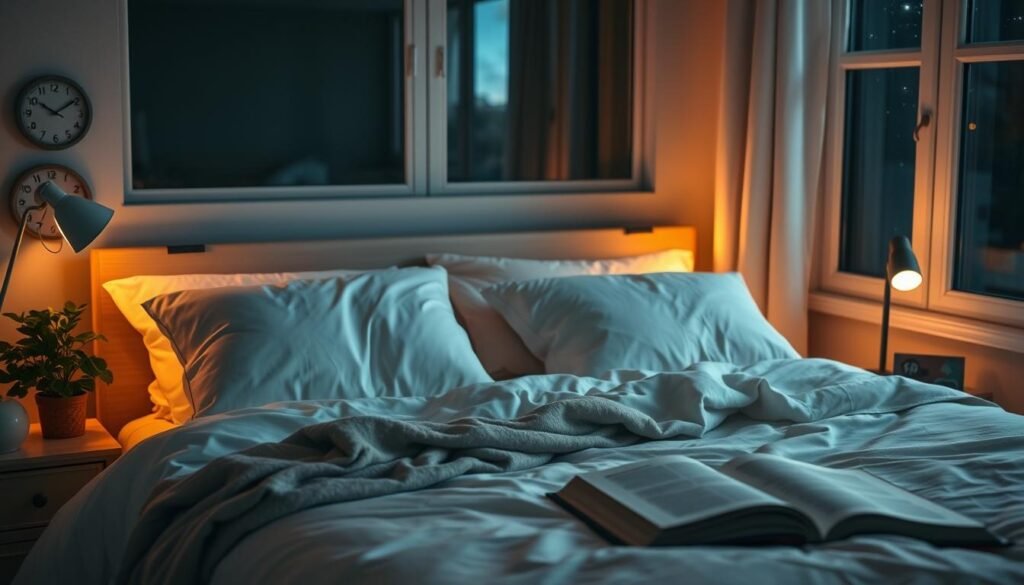About one in five American adults struggle to get enough sleep. This fact highlights a big problem: feeling very tired but unable to fall asleep. Many things, like stress or physical issues, can cause sleep problems. Figuring out why sleep evades us is key to feeling better.
It’s a strange problem when you’re too tired to stay awake but can’t sleep either. This guide will explore why this happens and how to sleep better. Let’s learn how to win the fight for a good night’s rest together.
Key Takeaways
- One in five American adults experience sleep deprivation.
- Hormonal fluctuations can significantly impact sleep quality.
- Caffeine can worsen sleep difficulties, even when consumed earlier in the day.
- Circadian rhythm disorders could lead to excessive daytime tiredness.
- Stress levels in modern life have substantially increased.
- Understanding sleep hygiene is essential for improving sleep quality.
- Exploring the psychological aspects can reveal deeper roots of insomnia.
Understanding the Tiredness and Sleeplessness Paradox
Many people find themselves tired but can’t sleep. This confusing situation is common among those with sleep problems. It can be caused by worries, stress, or disturbed sleep patterns.
Feeling worn out can make sleeping well hard. Studies show that some face a specific type of sleep trouble called paradoxical insomnia. People with it feel they haven’t slept at all, even when they have.
This condition can last for many months or years. It can also connect to mental health issues like anxiety. This makes the person feel even more stressed about not sleeping well. It leads to a cycle of ongoing tiredness.
Cognitive behavioral therapy (CBT) has shown good results in treating these sleep issues. Medicine can help too, but it’s also important to tackle the mental side. Working through emotions and thoughts is key to overcoming this sleep problem.
| Aspect | Details |
|---|---|
| Definition | Paradoxical insomnia describes a condition where individuals feel they haven’t slept despite evidence of sleep. |
| Duration | This type of insomnia can last months or even years. |
| Psychiatric Link | Often co-occurs with mental health conditions like schizophrenia and anxiety disorders. |
| Impact on Daily Life | Can exacerbate feelings of fatigue and distress, affecting relationships and daily functioning. |
| Therapeutic Options | Cognitive behavioral therapy and certain medications are effective treatments. |
Common Causes of Sleep Deprivation
Many people find it hard to get enough sleep. They feel tired and can’t stick to a regular sleep schedule. Adults should get 7 to 9 hours of sleep every night. When we don’t, it affects us in many ways.
Common causes of insomnia can include:
- Stress and Anxiety: Daily worries and high anxiety can ruin your sleep. This can lead to trouble sleeping now and in the future.
- Poor Sleep Hygiene: Bad sleep habits, too much caffeine, and screen time before bed hurt your sleep quality.
- Medical Conditions: Health problems like asthma, diabetes, and chronic pain make it hard to sleep well, making you feel more tired.
- Shift Work and Irregular Schedules: Working odd hours or a changing schedule throws off your body clock. This results in sleep problems.
- Age-Related Changes: Getting older can change your sleep patterns. This often makes it harder to sleep, impacting your health.
Insomnia can show up as short-term or long-term problems. Short-term insomnia usually comes from stress and gets better in a few days or weeks. On the other hand, long-term insomnia lasts for three months or more. It’s often linked to big changes in your life or health.
If you can’t sleep well for a long time, it’s important to see a doctor or a sleep expert. Treatments like cognitive behavioral therapy for insomnia (CBT-I) or medicines can really help. They lower the bad effects of not sleeping enough.
Why Am I So Tired But Can’t Sleep: Psychological Factors
It’s crucial to know how your mind affects your sleep. Stress and worry can make it hard to fall asleep. Because when you’re stressed, your mind keeps racing, stopping you from sleeping well. Life’s tough times, like breaking up or losing someone, make this worse. They tire you out more.
Stress and Anxiety
Many people today are dealing with chronic stress. This stress makes your body react in ways that stop you from resting well. Along with stress, anxiety comes into play. It messes up the sleep of about 90% of anxious people. That’s why handling stress properly matters a lot. Doing things like meditating or working out helps calm the mind. This improves how well you sleep.
Emotional Turmoil and Its Effects
Emotional upsets deeply affect your sleep. Whether it’s a big life change, sorrow, or ongoing arguments, it leads to deep tiredness. Studies say around 10% of adults face insomnia due to these emotional issues. And, avoiding things that are good for your mental health makes sleeping even harder. It’s key to deal with these emotional issues. If not, sleep troubles could get worse and affect your overall mental health.
| Emotional Distress Issues | Potential Sleep Impact |
|---|---|
| Grief (loss of a loved one) | Difficulty falling asleep, increased waking |
| Relationship breakups | Insomnia and heightened anxiety |
| Major life changes (job loss, moving) | Restlessness and increased nighttime awakenings |
| Chronic unresolved conflicts | Persistent fatigue and emotional exhaustion |
The Role of Circadian Rhythm in Adequate Sleep
Circadian rhythms are like built-in clocks influencing sleep, hormone levels, and well-being. They help decide how well we sleep. When in harmony with daily life, they ensure good sleep and lively days. Understanding this clock is key to better sleep and functioning.
How Circadian Rhythm Impacts Sleep Quality
The circadian rhythm’s sync with daily life impacts sleep quality. Light, activity, and diet influence it. For adults, a good rhythm means better sleep at night, vital for restfulness. Disrupted sleep patterns can cause emotional issues, fatigue, and stress. A regular sleep schedule, exercise, and less screen time before bed can help.
Disruption of Circadian Rhythm: Causes and Consequences
Shift work, jet lag, and erratic sleeping can disrupt circadian rhythms, harming sleep quality. These disruptions can make falling asleep hard and lead to frequent wake-ups. Short-term, you might see memory issues and less energy. Over time, chronic sleep misalignment can risk health, affecting metabolism, hormones, and brain function.

| Disruption Type | Potential Effects |
|---|---|
| Shift Work | Chronic fatigue, performance issues, emotional difficulties |
| Jet Lag | Difficulty adjusting, fatigue, impaired cognitive function |
| Irregular Sleep Patterns | Increased risk of chronic health concerns, emotional distress |
| Long-term Disruption | Hormonal imbalances, metabolic issues, increased susceptibility to illness |
By adopting a consistent routine and a sleep-friendly environment, you can improve your sleep and well-being. These steps promote a healthier circadian rhythm.
Poor Sleep Hygiene Practices
Sleep hygiene is key for good sleep and health. It includes habits that help or harm our sleep. Poor sleep habits, like not keeping a regular sleep schedule, drinking too much caffeine, and using screens before bed, can harm our sleep and health.
Understanding Sleep Hygiene
Good sleep hygiene can better your sleep. Studies show over 80% of people sometimes struggle to fall asleep. This shows we need to fix bad sleep habits linked to worse health. While treatments like cognitive behavioral therapy (CBT-I) exist for insomnia, improving sleep hygiene is also crucial for better sleep.
Examples of Poor Sleep Hygiene
- Irregular Sleep Schedule: Changing sleep times mess up your body’s clock.
- High Caffeine Consumption: Drinking caffeine late in the day can keep you awake.
- Excessive Screen Time: Screens before bed can make it hard to relax.
- Insufficient Natural Light: Not getting enough daylight can affect your sleep at night.
- Unwinding Routines: Skipping a calming bedtime routine can make sleeping tough.
Learning about these poor sleep hygiene examples can guide us to better habits. Those needing help with sleep may try controlled breathing or the 4-7-8 technique. These can soothe the nervous system and ready the body for sleep. To learn more about sleep’s importance, read this article on insomnia’s risks.
Identifying Underlying Sleep Disorders
Knowing why you’re always tired can help find certain sleep disorders. Conditions like insomnia and sleep apnea play big roles in sleep loss. This affects health a lot. By knowing about these issues, you can get proper help. This will make your sleep better.
Common Sleep Disorders Like Insomnia and Sleep Apnea
Insomnia makes it hard to fall or stay asleep. This leads to being tired during the day. On the other hand, sleep apnea causes breathing to stop and start in sleep. This disrupts sleep a lot. Both can either happen together or alone. They both harm good sleep patterns.
Other Sleep Disorders Affecting Sleep Quality
Other problems like restless legs syndrome can also hurt sleep. This makes legs feel like they need to move, which ruins sleep. Knowing about these sleep issues is key. Seeing a doctor for advice is very important. They can offer treatments to improve your sleep. For more about these disorders, check out MedlinePlus.

Hormonal Changes and Their Contribution to Fatigue
Hormonal changes can really affect our sleep at different times in our lives. Estrogen and progesterone, for example, can make it hard for us to sleep well. Because of these changes, people may experience insomnia, hot flashes, or sleep disruptions.
How Hormones Disrupt Sleep Patterns
A lot of research shows that hormones can mess with how well we sleep. For women around menopause, insomnia is very common. About two-thirds report sleep problems due to changing hormone levels. Pregnancy can also make sleep difficult, which may increase the risk of feeling very sad after giving birth.
Thyroid issues, like hypothyroidism or hyperthyroidism, can also cause sleep problems. This happens because of changes in thyroid hormone levels. Melatonin, which helps us sleep, tends to decrease as we get older. This leads to more insomnia in older adults.
Lifecycle Stages Impacting Hormonal Levels
Different stages of life affect our hormones and sleep in various ways. Big life events like puberty, pregnancy, and menopause come with big hormone changes. During pregnancy, levels of estrogen and progesterone go up, affecting sleep. But during menopause, these levels change again, leading to sleep problems like hot flashes.
| Lifecycle Stage | Hormonal Changes | Potential Sleep Issues |
|---|---|---|
| Puberty | Increase in sex hormones | Varying sleep patterns due to developmental changes |
| Pregnancy | Elevated estrogen and progesterone | Insomnia due to discomfort and hormonal fluctuations |
| Menopause | Decreased estrogen and progesterone | Insomnia and hot flashes disrupting sleep |
| Older Age | Declining melatonin production | Increased insomnia and difficulty falling asleep |
By understanding how hormones and sleep connect, people can find ways to deal with their sleep issues.
Improving Sleep Environment for Better Rest
Making your sleep space better can really up your sleep quality. Things like how much noise, the kind of light, and how warm or cool your room is are super important. They set up a good place for deep sleep. To sleep better, work on these things in your bedroom. This will make it a calm place for night-time.
Creating an Optimal Bedroom Environment
The best sleep environment needs a well-set and nice-feeling space. To make your bedroom the best for sleep, think about doing these:
- Declutter the space: A tidy room reduces distractions and promotes relaxation.
- Use blackout curtains: Blocking out sunlight can help maintain a dark environment for longer periods, enhancing sleep quality.
- Control temperature: Keeping the room at approximately 65° F (18° C) aids in achieving restful sleep.
Techniques to Enhance Sleep Conditions
To sleep better, look at different parts of where you sleep. Here are some ways to do it:
- Reduce noise levels: Using sound machines or earplugs can keep away annoying noises.
- Comfortable bedding: Choose great bedding that lets you move comfortably for a better sleep.
- Regular exercise: Working out often helps you fall asleep quicker and improves sleep quality.
For more ways on improving sleep quality, ensure your bedroom meets your needs. A right sleep environment, with good habits, sets the stage for restful nights.
| Element | Recommended Conditions |
|---|---|
| Temperature | Approximately 65° F (18° C) |
| Light | Dark environment using blackout curtains |
| Noise | Quiet or white noise from machines |
| Bedding | Comfortable and breathable materials |
| Space | Decluttered environment for focus and relaxation |
Effective Stress Management Techniques to Aid Sleep
Managing stress is key to better sleep. About 44% of adults say stress keeps them up at night. It’s vital to use effective stress management strategies. Techniques like breathing exercises can help calm the mind and body. This creates a good setting for sleep.
Breathing Exercises and Relaxation Techniques
Gentle breathing exercises can help reduce stress and promote relaxation. Diaphragmatic breathing soothes the body’s stress response. The 4-7-8 technique has you breathe in for four seconds, hold for seven, and exhale for eight. This method is good for breath control and reducing anxiety).
Progressive muscle relaxation also works well. You tense and relax different muscle groups in turn. It reduces muscle tension and helps you relax deeply. This makes falling asleep easier. Practices like yoga and tai chi lower stress hormones. They help with cortisol and adrenaline levels too.
Meditation and Mindfulness Practices
Adding meditation to your bedtime routine can help with stress and sleep problems. These methods help you focus and lower your anxiety. They improve well-being. Practices like body scans and yoga nidra bring calm. They make falling asleep easier.
Stress management can greatly improve how well you sleep. This is especially true if stress causes your insomnia. Regularly doing these activities can benefit your mental and physical health. Many don’t get help for sleep issues. Knowing how relaxation and stress management help is key to better sleep. For more, see this info on insomnia and mental health.
Practical Tips for Better Sleep
A good sleep routine can greatly improve your life. By sticking to a set bedtime and doing certain things, you can make your sleep better. These changes can help you feel better during the day.
Establishing a Regular Sleep Schedule
Going to bed and waking up at the same time every day is good for you. It helps your body get into a rhythm. Here are some things to keep in mind:
- Try to keep the same sleep and wake times, even on weekends.
- Avoid long naps that can mess with night sleep.
- If sleep problems are affecting your day, talk to a doctor.
Activities to Promote Sleep Readiness
Having a calm bedtime routine tells your body it’s time to rest. These steps can make it easier to fall asleep:
- Don’t have caffeine or nicotine late in the day.
- Keep your sleeping area cool, between 65 and 72 degrees Fahrenheit.
- Do calming things like read or meditate before bed.
- Have a light snack instead of a big meal before sleep.
- Be active during the day, but don’t exercise hard right before bed.
- Reduce noise with earplugs or a white noise machine.

Making these changes can create a better sleep space and routine. By following a regular sleep schedule and preparing for bed in these ways, you can sleep better and feel healthier.
| Activity | Impact on Sleep |
|---|---|
| Consistent Sleep Schedule | Trains the body for better sleep habits |
| Exercise (3 hours before bedtime) | Boosts slow wave (deep) sleep |
| Cool Bedroom Temperature | Enhances comfort and sleep quality |
| Limiting Evening Activities | Promotes a soothing bedtime ritual |
| Healthy Evening Snacks | Prevents hunger without heavy meals |
Conclusion
Understanding how tiredness and sleeplessness are linked is key for better sleep. This article has shared many ways to improve sleep. They include changing habits and understanding medical conditions that make you tired.
By setting a regular sleep time and practicing good sleep habits, you can start to sleep better. Making small changes, like reducing bright light at night and not having caffeine or alcohol before bed, helps a lot. If sleep problems like insomnia or sleep apnea are an issue, getting medical help is important. Good sleep habits make you feel better and help you perform better in your day.
To beat sleep problems, it’s important to stick with healthy practices and learn about managing sleep. Making your sleeping area right for rest and taking positive steps can lead to better sleep. For more tips on fighting fatigue and sleep issues, check out this informative resource.